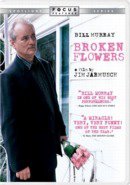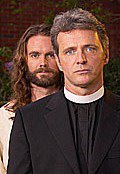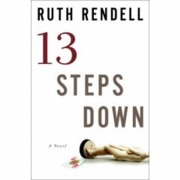 Quick takes on the most recent additions to my iTunes libraryHe Was a Friend of Mine • Willie Nelson No big fat hooks here -- just Willie Nelson at his plaintive best in a gently strumming ballad that currently enjoys prominent soundtrack placement.
Quick takes on the most recent additions to my iTunes libraryHe Was a Friend of Mine • Willie Nelson No big fat hooks here -- just Willie Nelson at his plaintive best in a gently strumming ballad that currently enjoys prominent soundtrack placement.
Better Now • Collective Soul Unabashedly fun and upbeat: "Oh, I'm happy as Christmas!" Ed Roland sings. Why wasn't this driving, saxophone-juiced tune a big radio hit? It would've been a welcome counterpoint to all those whiny, grating Avril Lavigne songs. At least someone had the good sense to use it in a Special K (!) commercial. The Collective can be counted on for one great pop rocker from every album -- "Shine," "December" and "Run" being past winners.
Love Song for a Vampire • Annie Lennox This was a single and featured in the 1992 Dracula soundtrack, yet I somehow never heard it until someone sent it to me on a mix tape back in the latter days of something called the cassette. It's a typically devastating Lennox performance and sounds like a late '80s holdover, but in a good way.
No More Drama • Mary J. Blige Mainly because it's based on that hypnotic and moving piano theme from The Young & the Restless, but I've liked Mary J. since "Real Love."
Tear You Apart (Radio Edit) • She Wants Revenge Sounds a bit gothy and perhaps a tad Depeche Mode, but this one is tough to pigeonhole. Think depressing, synthy '80s bands hardened by a bit of Nine Inch Nails sentiment, and you're on the trail. A former free iTunes download that's digging deeper into my brain each time I hear it.
More Shine • Si*Se Another former freebie, this one sounds a bit like Dido by way of The Cardigans, but with more strings and less kitsch. Another catchy tune I never would have heard anywhere else.
Bad Things • Jace Everett Yet another freebie, and this one delivers the line of the year thus far: "When you came in, the air went out." The hook here is "I wanna do bad things with you." It's a sleek country tune somewhat reminiscent of Chris Isaak's poppier "Baby Did a Bad Bad Thing."
 Genre: Bill Murray's mature stage
Genre: Bill Murray's mature stage
Director: Jim Jarmusch
DVD release: Jan. 3, 2006
Verdict: &&&It's amazing what filmmakers can do these days with a catatonic Bill Murray. At one point in Broken Flowers, he's sitting alone on the couch in his darkened apartment with a glass of champagne bubbling in front of him and Marvin Gaye playing on the stereo as he stares blankly ahead. His range in this movie varies only from total despondence to partially awake. Yet, what could simply be dull movie making becomes a profound statement on modern suburban emptiness or a sustained emotional mood that is its own reward independent of plot. But wait, there is a soupcon of plot here: Don Johnston (Murray) receives a letter from an old flame telling him he has a son who has set out on a journey to find him. Aided by his mystery-obsessed neighbor, Johnston takes his own road trip to visit his past flames and determine which one may be the mother of his child. Or is someone just playing a trick on him? With each visit, Johnston sees a few subtle clues, and there is some mild humor with the likes of Sharon Stone and her uninhibited daughter. If you don't mind ambiguous endings and expect less from this than from Lost in Translation, you just might enjoy it.
A little bonus for folks like yours truly whose last name really is Johnston: When people think he says "Don Johnson," he says, "Johnston, with a T." If I had a dollar for every time I've said that …
 Genre: Good question.
Genre: Good question.
Logistics: NBC, 9 p.m. Fridays, unless censored.
Verdict: &&1/2Make no mistake, I watched this show for one reason only: The nearest NBC affiliate yanked it from the schedule. I have a problem with people attempting to control what I watch for no reason other than some of the content makes them uncomfortable. In its place, they apparently aired infomercials – is there any more offensive form of programming? Fortunately, my cable provider gives me another affiliate. Setting aside The Book of Daniel's button-pushing elements and my or your or Jerry Falwell's feelings about them, the show is mildly amusing, at best. It seems to be going for a Desperate Housewives sort of darkness in its humor, and it only hits the target about half the time. Jesus appears in the long-haired, robe-clad style of those church-wall portraits for conversations with lead Aidan Quinn (Rev. Daniel Webster), who has some kind of moral dilemma going involving money and mobsters, but it is about as clear as mud in episode two. The children have their relationship issues, and Mrs. Webster (Susanna Thompson) has major mother problems. In episode two, after discovering Mom's name is on the deed to the home she thought she owned, she copes by downing vodka. The cast, overall, is strong; Thompson was positively Emmy-worthy on Once and Again. This show, on the other hand, is neither Emmy worthy nor a threat to modern civilization any more than people who view it as a malignant piece of propaganda are.// Linkage // Official NBC The Book of Daniel site
 Genre: Psychological suspense
Genre: Psychological suspense
Published: Sept. 27, 2005, by Crown
Verdict: &&&1/2From the opening pages of 13 Steps Down, we know that we are about to witness the undoing of the principal characters – Mix Cellini, a man with an unhealthy interest in U.K. serial killer Reginald Christie and an obsession with a model with whom he has had several chance meetings, and his landlord, Gwendolen Chawcer, a grumpy, eccentric old woman (or "sarcastic old bitch," as Cellini pegs her) who spends her time reading the thousands of books lining the walls of her dark, cavernous old home and stores her flashlight in the refrigerator. We know that Cellini will undoubtedly kill and Chawcer is likely doomed to meet an unsavory fate, but it matters not: The pleasures of a Rendell novel lie in getting there. Her ability to convey the human mind's self-debate and rationalizations as, for example, Cellini finds ways – transparent to anyone but himself – to put himself in the path of his model crush is simply stunning. There's also a devastating look at unrequited love as Chawcer pines for the doctor who tended her father when she was a young lady. At this late stage, she takes to writing him letters and obsesses over the possibility that, all those years ago, he saw her accompany a family maid to an abortionist and deemed her classless. The use of a real-world figure, Christie, and the appearance on several occasions of a "ghost" are effective and welcomed deviations from typical Rendell plot elements, but Cellini's world unravels in classic Rendellian fashion. It's worth noting that the British master, after 41 years and more than 60 novels, apparently graced the New York Times bestseller list for the first time with this one thanks to a U.S. publicity blitz, and Entertainment Weekly named 13 Steps Down the number three fiction book of the year.// Also see // Make Death Love Me • Ruth Rendell
 Quick takes on the most recent additions to my iTunes library
Quick takes on the most recent additions to my iTunes library


